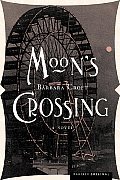
"In August of 1914, on the eve of World War I, Jim Moon, then sixty-eight years old, stepped off the stern of a ferry in New York harbor just as the boat passed under the Brooklyn Bridge." And so Moon's Crossing begins. Croft's novel doesn't necessarily track why Moon ended his own life and it only examines his suicide's effect on the young woman that he lived with. Croft's narrative is punctuated by her change of narrator from paragraph to paragraph, jumping from Moon writing in his journal as a young man in the Civil War to his estranged son Winslow, Win, in present time (1914,) to the mysterious young woman that Moon lived with in New York as she's investigated by a policeman.
The story follows Moon as he serves in the Civil War, leaves home and makes his way cross country taking on odd jobs, searching for that elusive 'something' that he never seems to find. When Moon leaves his wife for Chicago's Columbian World Fair in 1893, he never returns. Instead, he teams up in an unusual friendship with an awful confidence man that runs amok through the streets of the "White City," Chicago.
I enjoyed Croft's novel mostly because of her sweeping language. Though it mostly takes place in Chicago, Croft wrote like a Southerner tells a story, sitting on the porch. While telling a story in which we know what happens, but the event took place a long time ago, our minds tend to forget certain aspects only to remember them later on. Croft's novel is too finely woven to imply that she left anything out or that it was incohesive. Rather, it's her ability to quickly and gently nudge the audience on, telling an all too real story of a person trying to find themselves in the vast American landscape. We may not like what we find along the way, but at least it's real.
Now reading:
Gogol Dead Souls
Just bought:
Amitav Ghosh The Circle of Reason
Listening to:
The Red Sox on NESN...losing 10 -2 in the 8th...ouch
4 comments:
I look forward to your thoughts on Dead Souls -- it's something I've wanted to read for a while. Have you read The Namesake (Lahiri?) about the guy named after Gogol? Ever since I read that, the need to read Gogol has become more urgent ...
Dorothy, I did read The Namesake but I only really liked the beginning and end. But I loved how his father named him Gogol. I just wish that Gogol accepted his name at the end (more than he did.)
p.s. I work at Houghton Mifflin and we publish Lahiri (and Jonathan Safran Foer and Philip Roth)
Cheers
Yeah, now that you mention it, I thought there was some weird stuff in the Lahiri book. Actually, I listened to it in the car, and didn't read it. Anyway, my point is that it made Gogol that much more interesting to me. Do you like your job?
I publish college text books. And though I like the people I work with and enjoy the process of book making, the pay's awful. I'd like to get into the trade division, but I don't see that happening anytime soon.
Post a Comment